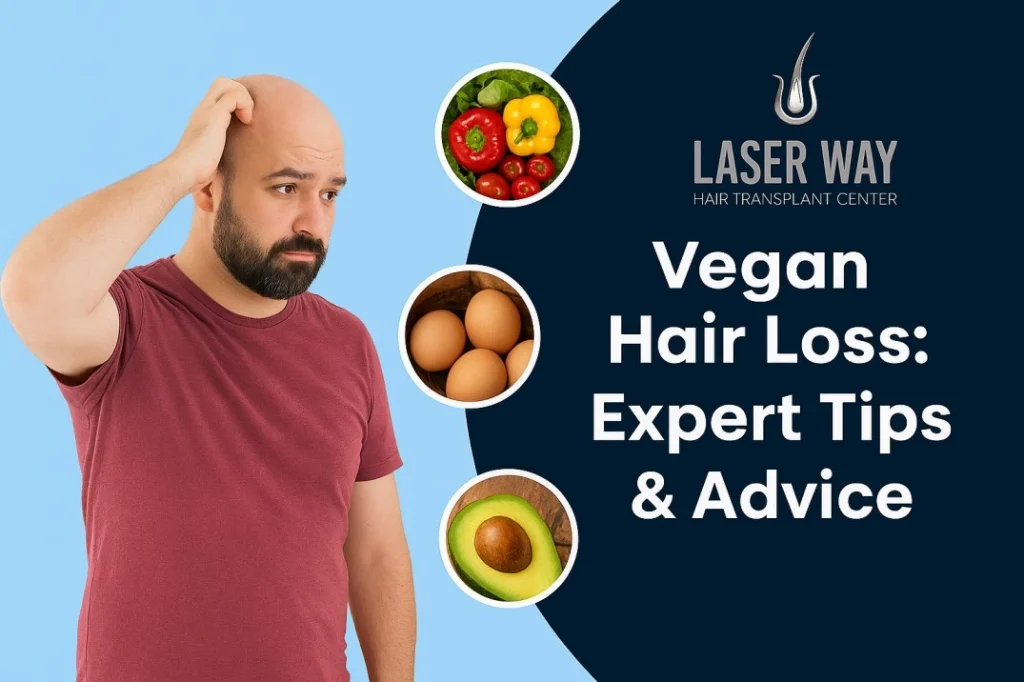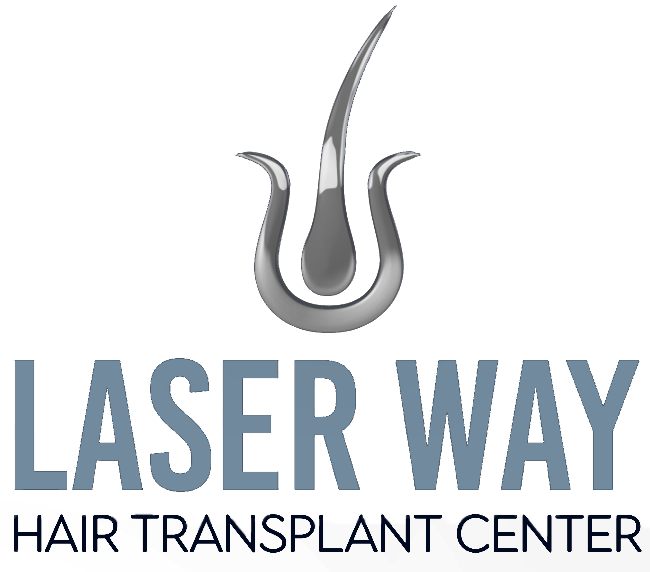Choosing a vegan lifestyle is a popular decision for many people focused on health and ethics. A well-planned, plant-based diet can offer numerous benefits, including improved heart health and lower blood pressure. However, a sudden shift in eating habits without careful planning can lead to health concerns. If your diet is not balanced, you may miss out on essential vitamins, minerals, and other nutrients. One of the most common side effects of such a deficiency is hair loss.
Hair loss related to diet can often be managed with supplements, topical treatments, or advanced procedures like a hair transplant. In this article, we will explore how a vegan diet can affect your hair, which nutrient deficiencies you should be aware of, and how you can better care for your hair.

So, does a vegan diet really cause hair loss? Let’s find out by looking at:
- Which nutritional gaps on a vegan diet might lead to hair loss.
- What plant-based proteins and fats you should consume.
- What steps to take if you experience unusual hair thinning on this diet.
How Does a Vegan Diet Affect Hair Health?
Our hair consists of two main parts: the hair shaft (the visible part we style) and the hair follicle (which lies beneath the skin). While the hair shaft is relatively resilient, the hair follicle is highly sensitive, especially to changes in our diet. The cells in hair follicles divide and grow rapidly, which means they are quickly affected by any nutritional shortages.
For healthy growth, hair follicles require a steady supply of proteins, vitamins, and minerals, such as vitamins B, C, E, iron, and zinc. These nutrients support robust hair growth. A deficiency in any of these can not only weaken your immune system but also directly impact the health of your hair, leading to thinning and shedding.
Nutritional Deficiencies and Vegan Hair Loss
Iron
Iron deficiency is a common issue for those on a vegan diet. While low iron levels are sometimes linked to a reduced risk of certain chronic diseases, a significant deficiency can decrease your body’s red blood cell count. This lowers the amount of hemoglobin in your blood, which is responsible for carrying oxygen throughout your body.
Without enough iron, hair follicles don’t receive the oxygen they need to produce new cells. As a result, they can’t divide and grow properly, which can lead to hair loss.
Iron Sources: While meat offers high iron absorption, plant-based sources can be just as effective if consumed correctly. To boost your iron levels, include foods like tofu, spinach, kale, lentils, chickpeas, pumpkin seeds, and even dark chocolate in your diet.
Protein
Protein deficiency is a primary cause of diet-related hair loss. When your body doesn’t get enough protein, it prioritizes essential functions over non-essential ones like hair growth. This can lead to hair breakage and shedding as the follicles are pushed into a resting phase, halting the growth cycle.
Protein Sources: Excellent plant-based protein sources include lentils, quinoa, soy products like tofu and edamame, and various beans.
Zinc
Some plant-based foods, like whole grains and legumes, contain phytic acid, which can interfere with the body’s ability to absorb zinc. Zinc is crucial for hair tissue growth and repair. It also helps keep the oil glands around the follicles working correctly.
Zinc Sources: To ensure you get enough zinc on a vegan diet, you may need to consume more zinc-rich plant foods or consider a supplement.
Lysine
Lysine is an essential amino acid that our bodies cannot produce. It plays a role in iron and collagen absorption, and collagen is a vital component of our hair’s structure. A lack of lysine can contribute to weakened hair.
Lysine Sources: Pistachios, tofu, spirulina, lentils, and chickpeas are all great sources of lysine. Supplements are also an option to combat a deficiency.
Omega-3 Fatty Acids
Omega-3 fatty acids are important for maintaining hair elasticity and promoting growth. Without enough omega-3s, your scalp can become dry and flaky, and your hair may become brittle and prone to breaking.
Omega-3 Sources: You can get these healthy fats from plant-based foods such as flaxseeds, chia seeds, walnuts, and hemp seeds.
Vitamin B12
Vitamin B12, or cobalamin, is critical for supporting oxygen delivery to hair follicles. It also aids in nerve health and DNA synthesis. An interruption in any of these processes can contribute to increased hair shedding.
Vitamin B12 Sources: Since B12 is primarily found in animal products, supplementation is often necessary for those on a strict vegan diet.
Biotin
Also known as Vitamin B7, biotin helps produce keratin, the main protein that makes up our hair. While our bodies can produce some biotin, a deficiency can disrupt the hair growth cycle, leading to thinning.
Biotin Sources: Nutritional yeast is a fantastic source of biotin. You can also find it in sweet potatoes, peanuts, cauliflower, and almonds. Biotin supplements are another popular way to ensure adequate intake.
Iodine
Iodine is essential for the thyroid gland, which produces hormones that regulate metabolism and growth. An iodine deficiency can lead to hypothyroidism, a condition where the thyroid doesn’t produce enough hormones to support a healthy hair growth cycle, causing hair loss.
Iodine Sources: Iodized salt is a simple source. Sea vegetables like kelp or nori are also rich in iodine.
Vitamin D
Vitamin D receptors are present in our hair follicles, and the vitamin helps stimulate new follicle creation. A deficiency can slow the transition of follicles from the resting to the growing phase, resulting in hair thinning over time.
Vitamin D Sources: The most natural source is sunlight. You can also find it in fortified non-dairy milks and cereals. If you are clinically deficient, a supplement is recommended.
How Can You Prevent Vegan Hair Loss?
A well-balanced vegan diet is the best way to prevent hair loss. The key is to ensure you are getting adequate protein from diverse plant-based sources like lentils, tofu, quinoa, and chickpeas.
You should also focus on including nutrient-dense foods in every meal. Nuts, seeds, and whole grains provide many of the essential vitamins and minerals your body needs. For nutrients that are harder to obtain from a vegan diet alone—such as vitamin B12, zinc, and omega-3s—look for fortified foods or consider high-quality supplements.
Avoid drastic calorie cuts, as this can lead to malnutrition and stress on the body. It’s always a good idea to monitor your nutrient levels and consult with a healthcare provider or a registered dietitian.
Can You Regain Hair Lost from Deficiencies?
If your hair loss is due to a temporary mineral or nutrient deficiency, addressing the underlying issue can often lead to regrowth. However, for more advanced or persistent hair loss, other treatments may be necessary. Topical solutions like minoxidil can help stimulate new growth, while medications like finasteride are sometimes prescribed for male pattern baldness.
If you believe medications and dietary changes are not enough, a hair transplant might be the right solution for you. At Laser Way Clinic, we specialize in providing safe, effective hair restoration procedures tailored to your unique needs. A transplant offers a permanent and natural-looking solution that gives you control over your hairline.
If you are considering a hair transplant to restore your hair, book a free consultation with the experts at Laser Way Clinic today.
